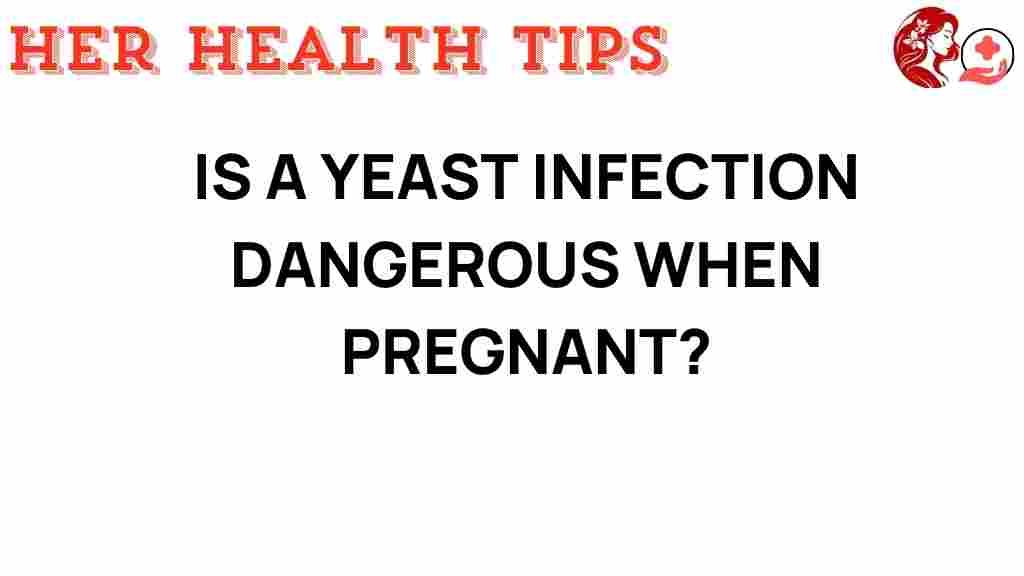Unraveling the Risks: Are Yeast Infections Dangerous During Pregnancy?
Pregnancy is a beautiful journey, but it often comes with its own set of challenges, including various health issues. One common concern among expectant mothers is the occurrence of a yeast infection. This article aims to unravel the risks associated with yeast infections during pregnancy, discussing symptoms, treatment options, prevention strategies, and their implications for maternal care and prenatal health.
Understanding Yeast Infections
A yeast infection, also known as candidiasis, is caused by an overgrowth of the fungus Candida, primarily Candida albicans. While it is a common condition, its implications during pregnancy can raise concerns about maternal health and fetal development.
Symptoms of Yeast Infections
Recognizing the symptoms of a yeast infection is crucial for timely treatment. Common symptoms include:
- Itching and irritation in the vaginal area
- Unusual vaginal discharge (often thick and white, resembling cottage cheese)
- Redness and swelling of the vaginal tissues
- Pain during intercourse
- Burning sensation during urination
If you experience any of these symptoms during pregnancy, it is essential to consult your healthcare provider for further evaluation and treatment options.
Health Risks Associated with Yeast Infections During Pregnancy
Many expectant mothers may wonder, “Are yeast infections dangerous during pregnancy?” The answer largely depends on individual health conditions and the severity of the infection.
- Increased Risk of Complications: While yeast infections are generally not harmful to the fetus, they can lead to complications such as:
- Preterm labor in severe cases
- Increased risk of vaginal delivery complications
- Potential for transmission during delivery, resulting in oral thrush in the newborn
- Impact on maternal mental health due to discomfort and stress
- Underlying Conditions: Pregnant women with compromised immune systems or those with diabetes may face higher risks of severe infections.
Treatment Options for Yeast Infections During Pregnancy
When it comes to treating yeast infections during pregnancy, it is crucial to choose safe and effective options. Here are the common treatment methods:
- Topical Antifungal Treatments: Over-the-counter antifungal creams and suppositories such as clotrimazole and miconazole are generally considered safe during pregnancy.
- Prescription Antifungal Medications: In cases of severe infection, a healthcare provider may prescribe oral antifungal medication, although this is less common.
- Home Remedies: Some women find relief through home remedies like probiotic-rich foods (yogurt), coconut oil, or tea tree oil. However, always consult your doctor before trying these remedies.
Prevention of Yeast Infections During Pregnancy
Preventing a yeast infection during pregnancy is essential for maintaining good vaginal health. Here are some effective prevention strategies:
- Maintain Vaginal Hygiene: Keep the vaginal area clean and dry. Avoid using scented soaps and douches that may disrupt the natural flora.
- Wear Breathable Fabrics: Opt for cotton underwear and loose-fitting clothing to allow air circulation.
- Limit Sugar Intake: High sugar levels can promote yeast growth, so it’s important to maintain a balanced diet.
- Stay Hydrated: Drinking plenty of water can help flush out toxins and prevent infections.
- Consult Your Healthcare Provider: Regular prenatal check-ups are essential for monitoring your health and managing any symptoms that arise.
Maternal Care and Prenatal Health
Maternal care during pregnancy goes beyond routine check-ups. It encompasses understanding and managing any health issues that may arise, including yeast infections. Here are some tips for ensuring optimal prenatal health:
- Educate Yourself: Knowledge about potential health risks, symptoms, and treatments can empower you to take charge of your health.
- Communicate with Your Provider: Keep an open line of communication with your healthcare provider about any concerns, symptoms, or changes in your body.
- Follow a Healthy Lifestyle: A balanced diet, regular exercise, and adequate sleep support overall health and can help prevent infections.
- Emotional Well-being: Mental health is equally important during pregnancy. Seek support if you’re feeling overwhelmed or anxious.
Troubleshooting Yeast Infection Concerns
If you suspect you have a yeast infection during pregnancy, here are steps to troubleshoot your concerns:
- Identify Symptoms: Take note of any symptoms you experience and when they began. This information can help your healthcare provider.
- Schedule an Appointment: Contact your healthcare provider for an evaluation. Early diagnosis can lead to effective treatment.
- Follow Treatment Recommendations: Adhere to the prescribed treatment plan and medications to ensure effective resolution of the infection.
- Monitor Your Condition: Keep track of any changes in symptoms after starting treatment and report them to your healthcare provider.
Conclusion
In conclusion, while yeast infections during pregnancy can be uncomfortable and concerning, they are generally manageable with proper care and treatment. Understanding the symptoms, health risks, treatment options, and prevention strategies are vital for maintaining good vaginal health and overall prenatal health.
If you experience symptoms of a yeast infection during pregnancy, do not hesitate to consult your healthcare provider. With the right approach to maternal care, you can navigate this common condition while focusing on the health and well-being of both you and your baby.
For more information on maintaining vaginal health during pregnancy, check out this informative guide.
Additionally, learn about the causes and treatments of yeast infections from reliable sources such as the CDC’s website.
This article is in the category Reproductive and created by HerHealthTips Team
